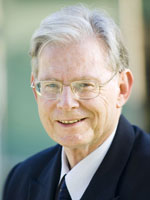Fossil fuels and an ecological us
The imperative and clarion call to abandon fossil fuels in favour of renewable energy is now urgent. A recent intercontinental report, headed by James Hansen from Columbia University in New York and involving the Chinese Academy of Sciences, predicts super storms and rising sea levels due to ice melts within decades, and says:
“We conclude that the message our climate science delivers to society, policymakers, and the public alike is this: we have a global emergency. Fossil fuel CO2 emissions should be reduced as rapidly as practical [1].”
At the same time, the Chinese Academy of Sciences has reported that increasing temperature on the Tibetan plateau means all the major rivers of Asia which emanate from the plateau are drying up, affecting some 2.3 billion people. No water, no food.
All nations, including Australia, have previously agreed to efforts to deal with these problems. They are ones which are already affecting Australia’s environment, its people’s food, water, energy and health security. How then can Australia support the development of what would be the world’s largest coal mine, which may be a tipping point for human and planetary disaster? It is because we do not recognise that we are ecological creatures, highly dependent on the natural environment and how we use it [2].
Bob Brown, whose career began as a family doctor, has issued an 11th hour call to action to stop the Adani coal mine development in Queensland [3], as have other Australian doctors and health professionals [4]. A concerted action by Australians-at-large can stop the Adani insanity and its threat to our health, wellbeing and very survival [5].
I urge you to strongly support this most important action.
Prof Mark L Wahlqvist AO
MD FRACP FAFPHM FAIFST FTSE
Editor: Support the Stop Adani effort. Read more from the Bob Brown Foundation. And watch Mark Wahlqvist’s keynote address to Lifestyle Medicine 2016 on Ecology and human health here.
- Hansen et al. Atmos. Chem. Phys., 16, 3761-3812, 2016. http://www.atmos-chem-phys.net/16/3761/2016/doi:10.5194/acp-16-3761-2016
- Wahlqvist, M.L., et al. Rethinking the food security debate in Asia: some missing ecological and health dimensions and solutions. Food Sec. (2012) 4: 657-670. doi:10.1007/s12571-012-0211-2. https://link.springer.com/article/10.1007/s12571-012-0211-2
- https://www.theguardian.com/commentisfree/2017/mar/24/the-adani-mine-is-this-generations-franklin-river-people-power-can-stop-it
- Butler, Colin, ed. Climate change and global health. CABI, 2016
- Wahlqvist ML. Ecosystem Health Disorders-changing perspectives in clinical medicine and nutrition. Asia Pacific journal of clinical nutrition. 2014 Mar 1;23(1):1-5. https://www.ncbi.nlm.nih.gov/pubmed/24561967

Emeritus Prof Mark L. Wahlqvist AO, BMedSc, MBBS, MD (Adelaide), MD (Uppsala), FRACP, FAIFST, FACN, FAFPHM, FTSE
Mark Wahlqvist is Emeritus Professor of Medicine, Monash University and Visiting Professor, Centre for Health Policy Research and Development, National Health Research Institutes, Taiwan.
He was educated at Adelaide and Uppsala Universities, is a Consultant Physician and has held chairs in Human Nutrition, Medicine, Epidemiology & Preventive Medicine between Melbourne’s Deakin and Monash Universities, Chair of Internal Medicine at Prince Henry’s Hospital, then the Monash Medical Centre, in Melbourne, Director of the APHNC (Asia Pacific Health & Nutrition Centre) at the MAI (Monash Asia Institute) and of the FAO Centre of Excellence in Food Safety at Monash University.
He has also held appointments at the Karolinska Institute in Sweden, the University of Indonesia and Zhejiang University in China. He was President of the International Union of Nutritional Sciences, Chair of the Australian Nutrition Foundation (Nutrition Australia), Foundation Chair of the WMCACA (Weight Management Code Administration Council of Australia) , a Board member of ANZFA, the Australian and New Zealand Food Authority (now FSANZ), Foundation Chair of the Food Safety Council of Victoria, chair of the Australian Academy of Science National Nutrition Committee, Foundation Editor-in-Chief of the Asia Pacific Journal of Clinical Nutrition.
His advisory board memberships have included the Harvest Plus program (International Food Policy Research Institute in Washington DC), the Riddet Food Research Institute at Massey University, New Zealand and the WHO Nutrition Advisory panel. He has been recognised with awards by the nutrition societies in Australia, Britain, the USA, Taiwan, Indonesia and China. He was awarded he Charlotta Medal by the Swedish Emigrants Research Institute and made an honorary Bataknese.



